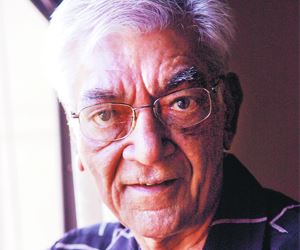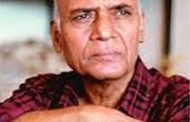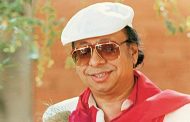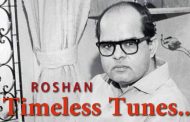Gulshan Kumar Mehta, popularly known by his pen name Gulshan Bawra was an songwriter and actor in Hindi cinema. In a career spanning 42 years, he has to his credit about 240 songs, he collaborated with noted music directors like Kalyanji Anandji, Shankar Jaikishan, and R D Burman composed almost half of songs in films like Khel Khel Mein (1975), Kasme Vaade (1976) and Satte Pe Satta (1982). Apart from Rd Burman hits, he is most remembered for his songs like, Mere Desh Ki Dharti in Upkaar (1968), and Yaari Hai Imaan Mera, Zanjeer (1974), both of which got him the Filmfare Best Lyricist Award. The latter also top the Binaca Geetmala annual list of 1973. As a character actor, he also appeared in a small number of Hindi films.
Gulshan Kumar Mehta, popularly known as Gulshan Bawra was born on 12 April 1937- 30 km from Lahore in a place called Sheikhupura. His father had a construction business, and his immediate family were Shri Labh Chand Mehta,father of Roop Lal Mehta and Chaman Lal Mehta, incidentally both their families were victims of the partition riots where young Gulshan witnessed his father and his cousin’s, father killed in Labh Chand Mehta’s haveli, in front of their own eyes. His elder sister at Jaipur, brought him and his elder brother up. After his brother got a job, they shifted to Delhi where he graduated from Delhi University. During college, he began to write poetry.
He wanted to come into films and applied for a job with the Railways. He was posted to Kota which was then in Rajasthan but when he arrived there, the vacancy was filled. His next call was luckily that for the post of a clerk at Mumbai and he arrived in the city in 1955. Gulshan struggled to get a film break, initially keeping his job on. Kalyanji (-Anandji), then on his own as Kalyanji Virji Shah, gave him his first opening in Chandrasena (1959) in the song ‘Main kya jaanu kahan laage yeh saawan matwala re’ sung by Lata Mangeshkar.
K-A’s first joint film, the Meena Kumari-Balraj Sahni starrer Satta Bazar later the same year marked his first brush with success with hits like ‘Tumhein yaad hoga kabhi hum mile the’ (Lata-Hemant), ‘Aakde ka dhanda’ (Rafi) and ‘Chandi ke chand tukdon ke liye’ (Hemant Kumar).
It was during the making of this film that the film’s distributor Shantibhai Patel christened him ‘Bawra’. He was very impressed by his lyrics but could not reconcile their excellence to the typical young man in his twenties who wore a rather colourful shirt. He said, ‘Main iska naam Gulshan Bawra rakhoonga. He looks like a ‘bawra’ (madman).’ When the film was released in Mumbai, the posters carried just three names, those of director Ravindra Dave, composers Kalyanji Anandji, and Gulshan Bawra, though the roster of lyricists included the topmost names of that time, Hasrat Jaipuri and Shailendra. ‘I left my job in 1961 and things were pretty smooth,’ says Bawra.
To date, Gulshan Bawra has written only 240 songs in a 42-year career, which is less than the number of films so many top names have done! But he claims to have the highest average among lyricists. ‘I never believed in working too much or being aggressive, one of the main reasons for which was that I had no children. In my time, I have charged Rs 90,000 for a film at a time when one could purchase a big flat for Rs 65,000! I have not compromised on my price – because I have never compromised on my work.’
Gulshan Bawra believes in sensible lyrics and avoids lyrics that are conceptually defective, or have grammatical mistakes. ‘Even Shailendra,’ he says, ‘wrote meaningless stuff like ‘Awara hoon, awara hoon, ya gardish mein hoon aasmaan ka taara hoon ‘, which should actually be ‘Awara hoon, awara hoon, main gardish mein bhi aasmaan ka taara hoon’. Gardish refers to struggle or turbulence and stars are never in this condition. Natural or universal truths should not be tampered with in the name of poetic license or to fit in to a given metre’, he says.
Almost half of his songs have been with R.D.Burman. His last release was Zulmi (1999) and his last hit was ‘Le pappiyaan jhappiyaan paale hum’ for Haqeeqat/1995, which landed him in his only controversy – of writing a vulgar song. As always, Bawra is selective and is doing two films only today. He finds today’s filmmakers, music barons and composers musically illiterate and thus is even choosier than before, as he lives a secure, relaxed life. ‘Why should I torture myself or waste my lyrics and talents on those who will ask me to do all sorts of compromises?’ he asks. His films in the ’90s include, besides Haqeeqat and Zulmi, Qurbani Rang Jaayegi, Tehkiqaat, Laat Saab, Maidan-E-Jung, Indrajeet and Chor Pe Mor.He died on 7 August 2009 at age 72 at his Pali Hill residence in Mumbai.Agency.








